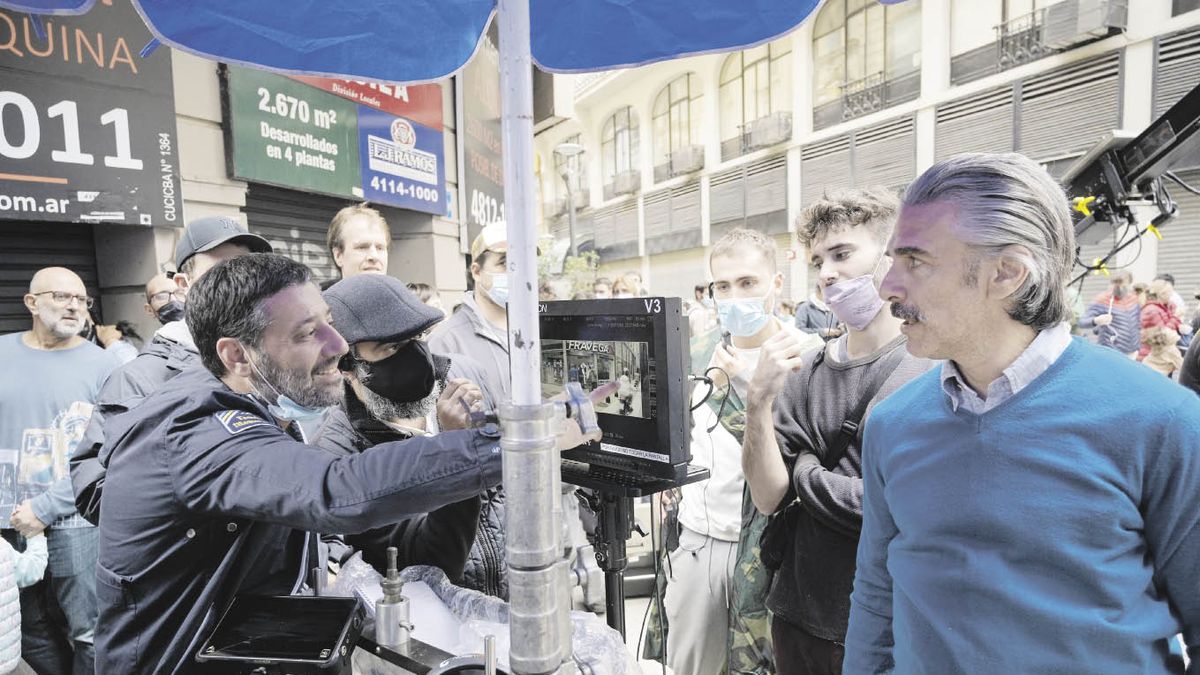Journalist: What things appear in the script that had to be invented to give cinematographic flight to an already unusual story?
Ariel Winograd: We start from what happened in real life, something very cinematographic in itself because it is the story of a loser, of second chances, about stagnation, about being in a corporation that sometimes does not let you fly. The biggest difference from reality is that there was an advertising agency that invented the campaign, and here we transformed the manager of Noblex into a more familiar company with a marketing team. That father-son relationship and the manager’s wife were also invented because the film also talks about what this father does so that his son can connect with him. This was the first viral campaign on Twitter in which the company spoke to users putting themselves in the same place.
Q.: Why do you think Paramount was interested in this story?
AW: He liked the idea and that there was a film that went through the theme of the World Cup precisely at the time of the World Cup. And our challenge was not only to make a good film and deliver it but to do it on time, that was the joke. They offered us a film about the case of the Noblex manager, but from there we went through everything to build what we wanted to tell. It was a joint work with script and production.
Q.: And what did they want to tell?
AW: For us it is the story about a father and a son. Of course there is the plot but the weight of the emotional arc that the two of them have is also crowned with one of the most beautiful endings I have filmed in my life. Beyond that Leo is in an insane moment of acting.
Q: You can’t help but address that father-son bond…
AW: While I was filming it I felt like it was a love letter to my dad and Leo felt the same way with his grandfather. And not because my old man was someone gray, he is an obstetrician and is happy with his work, but there was something. Maybe because of the weather, but I can’t say much because I’m always filming. And unlike other movies I’ve made about fatherhood, where I always identified with the father, here I often identified with the son. In fact, the character of the son wears my clothes from twenty years ago and there is a beautiful moment in which the father teaches him how to handle the son and only then do they manage to share a moment.
Q.: You say that Sbaraglia is in an “insane” moment of acting. How did he work with the actors?
AW: The biggest reference is the screenwriter Adam McKay in terms of the search for the truest truth within acting. His last film is “Don’t look up”. There are many scenes that we worked with almost documentary style, that meant that we filmed the scenes three times without cutting the camera from the beginning until the end, in open and closed shots. There was a search for truth in the tone. The most important thing was to find out what motivated him in his past and what made him numb and separated from his wife, not hook up with his son and become a person who spends time in his office to go off and do the ironing.
Q.: Is there inspiration in other films?
AW: I think of films like Jerry Maguirre, King Richard, Moneyball, stories where there’s a character who needs to have this second chance at life.
Q.: How is the work for the platforms, which multiplied post-pandemic?
AW: The platforms today are the studios. What has changed is that there are no longer any investment producers, but rather the film is completely hooked on the platforms, which bank everything. But the work is joint and you work the same way, there is no distinction of work but of financing. There is an explosion of content and that gives a lot of work, you have to evaluate which project to put your life into because there are many opportunities to generate content.
Q.: Why doesn’t cinema take off like theater and music?
AW: What happened with “30 nights with my ex” or “Argentina, 1985” is a good sign that cinema will gradually recover. As long as there are movies that generate real interest in the public, people will come back. When we premiered “Today the world is fixed” in summer we were at the peak of covid with 140 thousand cases per day, that luckily happened, like the time when there were protocols to enter the cinema with a mask and vaccination card. It was a moment of estrangement.
Source: Ambito
David William is a talented author who has made a name for himself in the world of writing. He is a professional author who writes on a wide range of topics, from general interest to opinion news. David is currently working as a writer at 24 hours worlds where he brings his unique perspective and in-depth research to his articles, making them both informative and engaging.




